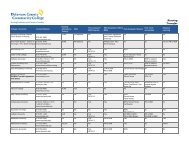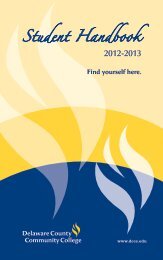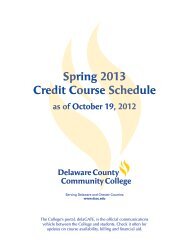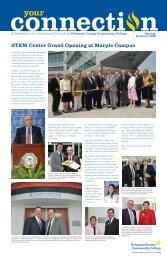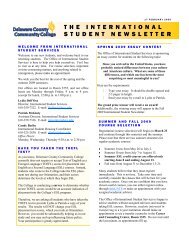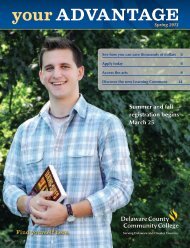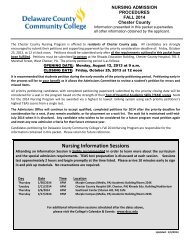2010 Catalog - Delaware County Community College
2010 Catalog - Delaware County Community College
2010 Catalog - Delaware County Community College
You also want an ePaper? Increase the reach of your titles
YUMPU automatically turns print PDFs into web optimized ePapers that Google loves.
FINANCIAL AID 17<br />
Refund to Federal Programs When the Student Withdraws<br />
The Higher Education Amendments of 1998, Public Law 105-244 creates a<br />
formula to determine the amount of Federal Student Financial Aid (SFA) Funds<br />
a student has earned when he or she completely ceases attendance without<br />
finishing the payment period (semester or summer term) for which the funds<br />
were awarded. Federal SFA funds are: the Federal Pell Grant, Federal SEOG<br />
Program, Academic Competitiveness Grant (ACG), Federal Work/Study<br />
Program, and the Stafford Loan Program. Up through the 60% point in each<br />
payment period, this formula (see “amount of federal student assistance<br />
earned” below) is used to determine how much federal financial assistance the<br />
student has earned at the time of withdrawal. After the 60% point in the<br />
payment period, a student is considered to have earned 100% of the federal<br />
financial aid program funds.<br />
This schedule applies only to the amount of SFA funds that a student, who<br />
withdraws from all courses they enrolled in during any payment period, may<br />
keep. The schedule does not apply to how much the <strong>College</strong> may charge for<br />
these courses.<br />
The student’s withdrawal date shall be:<br />
• The date the student began the <strong>College</strong>’s official withdrawal process, or<br />
• The date the <strong>College</strong> registrar received official notification from the student<br />
of her/his intent to withdraw. This can be in the form of a letter from the<br />
student, or another individual with written authorization from the student.<br />
• Or if the student does not follow the <strong>College</strong>’s official withdrawal process<br />
nor provide satisfactory official notification of withdrawal, then the date of<br />
withdrawal shall be set as the mid-point of the payment period.<br />
The calculation of amount of federal SFA assistance earned shall be:<br />
• If the student’s withdrawal date is on or before the 60% point of the<br />
payment period for which financial assistance was awarded, the<br />
percentage of total SFA earned is equal to the percentage of the payment<br />
period that was completed.<br />
• If the day the student’s withdrawal date occurs after the student has<br />
completed 60% of the payment period, the percentage earned is 100%.<br />
The amount not earned (the complement of the percentage earned) must be<br />
returned to the U.S. Department of Education..<br />
The calculation of the percentage of the payment period<br />
completed shall be:<br />
• Total number of calendar days in the payment period for which the<br />
assistance is awarded divided into the number of calendar days completed<br />
as of the day the student withdrew.<br />
The calculation to determine who pays the repayment:<br />
• If the student has not received a refund of SFA funds, the <strong>College</strong> repays<br />
the entire amount due.<br />
• If the student has received SFA funds, the <strong>College</strong> must repay the lesser of:<br />
1. The full amount of the unearned funds or<br />
2. The total institutional charges multiplied by the “unearned percentage.<br />
The student pays the remainder.<br />
Order of the return of SFA funds:<br />
• Unsubsidized Stafford Loan<br />
• Subsidized Stafford Loan<br />
• Federal Pell Grant<br />
• Academic Competitiveness Grant<br />
• Federal Supplemental Educational Opportunity Grant<br />
Leave of Absence Policy<br />
<strong>Delaware</strong> <strong>County</strong> <strong>Community</strong> <strong>College</strong> does not permit students to take an<br />
extended leave of absence during a semester. If a student experiences a<br />
sudden, unforeseen circumstance making it temporarily impossible for her/him<br />
to continue her/his studies during a particular semester, that student must<br />
formally withdraw from the <strong>College</strong> for that semester through the Student<br />
Records Office. If the student is unable to come to the Student Records Office,<br />
the student’s parent or spouse may initiate the withdrawal with written<br />
authorization from the student.<br />
Timing of the withdrawal will affect the amount of charges/refund accessed<br />
by the <strong>College</strong> and may affect the amount of federal Title IV financial aid that<br />
the student will be able to retain. See the section of the college catalog titled<br />
“Tuition and Fees” for further details.<br />
Financial Aid Programs<br />
NEED BASED PROGRAMS<br />
Federal Pell Grant<br />
A Federal Pell Grant does not have to be repaid. Pell Grants are awarded only<br />
to undergraduate students who have not earned a bachelor’s degree. To<br />
determine if a student is eligible financially, the U.S. Department of Education<br />
uses a standard formula, established by Congress, to evaluate the information<br />
you report on your FAFSA. The formula produces an Expected Family<br />
Contribution (EFC) number. The Student Aid Report (SAR) contains this<br />
number, in the upper right portion of page 1, and will tell you if you’re eligible<br />
for a Pell Grant; <strong>Delaware</strong> <strong>County</strong> <strong>Community</strong> <strong>College</strong> will tell you the amount<br />
you are eligible for on your award notification. Grants for the 2007-2008<br />
award year (July 1, 2007 to June 30, 2008) will be between $200 and<br />
$4,050. You can receive only one Pell Grant in an award year. How much you<br />
get will depend on your EFC, on your cost of attendance, whether you’re a fulltime<br />
or part-time student, and whether you attend school for a full academic<br />
year or less. You may not receive Pell Grant funds from more than one school<br />
at a time. The <strong>College</strong> will credit the Pell Grant funds to your tuition account.<br />
Your Award Letter will tell you when your grant will be paid and how much<br />
your award will be. If you’re otherwise eligible, you may receive a Pell Grant<br />
by enrolling less than half-time (3 to 5 credits); however, you won’t receive as<br />
much as if you were enrolled full time.<br />
Federal SEOG Program<br />
A Federal Supplemental Educational Opportunity Grant (FSEOG) is for<br />
undergraduates with exceptional financial need–that is, students with the<br />
highest demonstrated need–and gives priority to students who receive Federal<br />
Pell Grants. An FSEOG doesn’t have to be paid back. The U.S. Department of<br />
Education guarantees that each participating school will receive enough money<br />
to pay the Federal Pell Grants of its eligible students. There’s no guarantee<br />
every eligible student will be able to receive a FSEOG; students at the <strong>College</strong><br />
may be awarded an FSEOG based on the availability of funds. FSEOG awards<br />
will be between $100 and $500 a year, depending on when you apply, your<br />
level of need, the availability of funds and our awarding policies. When all the<br />
conditions of the award are met, the Financial Aid Office will credit your account.<br />
Federal Work/Study Program<br />
The Federal Work-Study Program provides jobs for students with financial<br />
need, allowing them to earn money to help pay education expenses. The<br />
program encourages community service work and work related to your course<br />
of study. Your Federal Work-Study wages will be at least the current federal<br />
minimum wage, but in most jobs at the <strong>College</strong> it will be higher. Your total<br />
Federal Work-Study award depends on when you apply, your level of need,<br />
and the funding level at the <strong>College</strong>. Student/Workers will be paid by the hour<br />
on a bi-weekly basis. Your Federal Work/Study job may be on campus or off<br />
campus. If you work off campus, your employer will usually be a private<br />
nonprofit organization or a public agency, and the work performed must be in<br />
the public interest. The amount you earn can’t exceed your total Federal Work-<br />
Study award. When accepting work hours you should consider your class<br />
schedule and your academic progress as well as your financial need.




